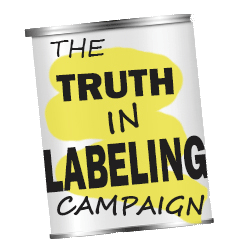If you Google “monosodium glutamate” and the word “controversy,” you come up with over 800,000 results. Does that mean there are legitimate opposing viewpoints about whether monosodium glutamate is safe or not – a true controversy?
Clearly there are two sides to every story, and we should be told both. But when the side claiming “controversy” offers nothing more than rigged research, name calling, and out and out lies, what they’re delivering is more akin to propaganda than it is to controversy. And in the case of MSG-safety, that’s all there is. There is no honest MSG-is-safe science. There are no scrupulous studies that demonstrate that MSG is a “harmless” food additive.
So if you’re wondering where the “facts” about MSG-safety are coming from, we have listed some of the arguments on which those ”facts” are based:
Purported evidence that MSG is a harmless food additive:
- Animal studies that falsely claimed to be replications of studies demonstrating brain damage in laboratory animals.
- The argument that animal studies demonstrating MSG-toxicity are invalid, because animals do not represent the human condition.
- The lie that humans can’t eat enough manufactured free glutamate (MfG) to cause the brain damage, endocrine disorders, and assorted reactions that laboratory animals experienced in the 1960s and 1970s – a claim that is particularly interesting in light of industry claims one and two above.
- Human studies that have nothing to do with MSG safety
- Human double-blind studies rigged to concluded that research has failed to demonstrated that monosodium glutamate or MfG had toxic potential. Lacing placebo materials used in those studies with an excitotoxic amino acid that causes the same reactions as caused by MSG (the aspartic acid in aspartame) has been just one of the many devices used to facilitate industry’s claim that “research has failed to demonstrated that L-glutamate has toxic potential.”
Bold-faced lies, including:
6. Glutamate contained in MSG is identical to glutamate in the human body.
7. MSG is very well researched and has been found to be safe.
8. MSG must be safe since the FDA has said so.
9. MSG has been used for over a century without adverse reactions.
10. MSG is naturally made, similar to yogurt, vinegar and wine.
11. Monosodium glutamate occurs naturally in food.
12. Humans can’t eat enough manufactured free glutamic acid (MfG) to cause the brain damage, endocrine disorders, and assorted reactions that the laboratory animals experienced.
And all this is packaged by the largest independently owned PR firm in the world, Daniel J. Edelman Public Relations (now working for Ajinomoto, the largest manufacturer of monosodium glutamate in the world). Edelman is reported to have told employees that “Sometimes, you just have to stand up there and lie. Make the audience or the reporter believe that everything is OK.”
Is “controversial” the right term to describe a situation where one side tells the truth about a subject while the opposing side resorts to rigging research, calling names, and telling lies?
About MSG-toxicity, there really is no controversy.
RESOURCES
Data
https://www.truthinlabeling.org/data.html
Brain lesions, obesity, and other disturbances in mice treated with monosodium glutamate.
Olney JW. Science. 1969 May 9;164(3880):719-21. PMID: 5778021
https://www.ncbi.nlm.nih.gov/pubmed/5778021
Excitotoxic food additives–relevance of animal studies to human safety.
Olney JW. Neurobehav Toxicol Teratol. 1984 Nov-Dec;6(6):455-62. Review. PMID: 6152304
https://www.ncbi.nlm.nih.gov/pubmed/6152304
Brain damage in mice from voluntary ingestion of glutamate and aspartate.
Olney JW, Labruyere J, de Gubareff T. Neurobehav Toxicol. 1980 Summer;2(2):125-9. PMID: 7290308
https://www.ncbi.nlm.nih.gov/pubmed/7290308
Brain damage and oral intake of certain amino acids.
Olney JW. Adv Exp Med Biol. 1976;69:497-506. No abstract available. PMID: 821314
https://www.ncbi.nlm.nih.gov/pubmed/821314
Brain-damaging potential of protein hydrolysates.
Olney JW, Ho OL, Rhee V. N Engl J Med. 1973 Aug 23;289(8):391-5. No abstract available. PMID: 4198222
https://www.ncbi.nlm.nih.gov/pubmed/4198222
Brain damage in infant mice following oral intake of glutamate, aspartate or cysteine.
Olney JW, Ho OL. Nature. 1970 Aug 8;227(5258):609-11. No abstract available. PMID: 5464249
https://www.ncbi.nlm.nih.gov/pubmed/5464249
Neonatal exposure to monosodium glutamate induces morphological alterations in suprachiasmatic nucleus of adult rat.
Rojas-Castañeda JC, Vigueras-Villaseñor RM, Chávez-Saldaña M, Rojas P, Gutiérrez-Pérez O, Rojas C, Arteaga-Silva M. Int J Exp Pathol. 2016 Feb;97(1):18-26. doi: 10.1111/iep.12157. Epub 2016 Jan 21. PMID: 26799547
https://www.ncbi.nlm.nih.gov/pubmed/26799547
What is monosodium glutamate
https://www.truthinlabeling.org/whatismonosodiumglutamate.html
The Toxicity/Safety of Processed Free Glutamic Acid (MSG): A study in Suppression of Information.
https://www.truthinlabeling.org/assets/manuscript2.pdf
Flawed industry studies
https://www.truthinlabeling.org/flawed.html
Six big fat lies
https://www.truthinlabeling.org/lies.html
Propaganda 101: The 8 ingredients in cutting edge propaganda
http://truthinlabeling.org/blog/2019/05/01/propaganda-101-the-8-ingredients-in-cutting-edge-propaganda/
https://www.edelman.com/insights/edelman-ad-age-best-places-work-2019
https://www.sourcewatch.org/index.php/Edelman
https://gawker.com/356220/sometimes-you-just-have-to-stand-up-there-and-lie



Please share. The FDA’s a player in hiding MSG toxicity (crying “controversy”), but your doctor and your congressman might care.